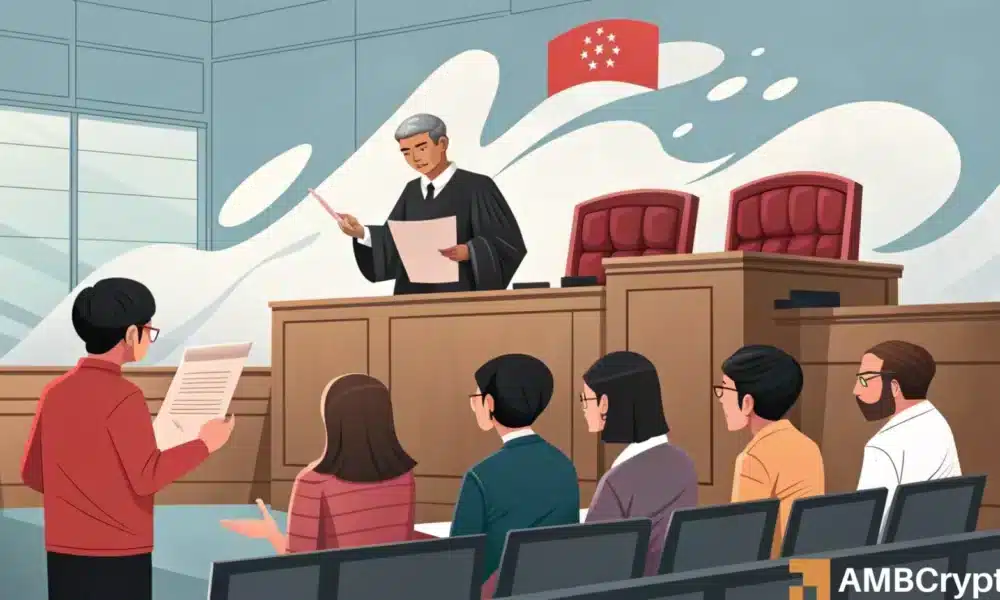Legal Battle Erupts Over Frozen Funds at WazirX: Users Seek Justice and Transparency
WazirX, one of India’s prominent crypto exchanges, is facing a turbulent legal challenge as users have united to sue the platform over frozen accounts and withheld funds. The ongoing dispute has spilled into Singapore’s High Court, with plaintiffs alleging that Zettai, WazirX’s local entity, unjustifiably froze both cryptocurrency and fiat assets. Notably affected are popular digital currencies like Bitcoin (BTC), XRP, Tron (TRX), Binance Coin (BNB), Tether (USDT), and various fiat currencies, leading to growing frustration among users demanding accountability and transparency from the exchange. The gravity of the situation underscores critical issues regarding user rights, asset recovery, and the overall integrity of crypto platforms.
Romy Johnson, an influential figure within the case, has filed a pivotal affidavit that poses significant challenges to WazirX’s restructuring plan. Johnson’s document calls into question Zettai’s decision to categorize all user assets, regardless of their status, into a singular restructuring scheme. In his comprehensive 40-page affidavit, he argues that Singaporean law prohibits the treatment of user-held trust assets as corporate liabilities. This classification includes a mix of unhacked digital tokens, fiat equivalents, and allegedly compromised assets, complicating the users’ opportunities for fair restitution and undermining their rights. The implications of Johnson’s affidavit could redefine legal protections for crypto users, especially in scenarios where exchanges face operational crises or bankruptcy.
Central to this case is the controversial nature of the supposed security breach that led to the asset freeze. Evidence gathered via blockchain technology indicates that the stolen funds were transferred through Zettai’s internal multisig wallets, which necessitate multiple authorizations for transactions to proceed. To date, no verifiable proof of an external hack has surfaced, raising substantial doubts regarding Zettai’s narrative about the breach. This uncertainty has heightened users’ concerns about the exchange’s operational transparency and the fate of their funds, amplifying calls for a comprehensive audit to track asset movements and identify responsible parties.
WazirX users are voicing their demands for greater transparency, advocating for a thorough investigation into the circumstances surrounding the fund freezes. This includes a push for clarity on who authorized the fund transfers under scrutiny. The High Court of Singapore recently rejected one of Zettai’s restructuring proposals, citing undisclosed connections to an offshore shell company. Johnson’s affidavit has further emphasized that the case extends beyond WazirX, positing that crypto assets held in trust belong to users, even amid bankruptcy. As the next court hearing approaches on July 15, 2025, WazirX has committed to keeping users informed via updates on its official X account, indicating that the legal struggle is far from over.
The reaction from the broader crypto community has been mixed. Critics of Johnson’s last-minute intervention have raised concerns that splitting asset categories further complicates the matter, particularly for users with compromised wallets who could face prolonged recovery times. Observations have been made that nearly 45% of affected users, classified under the compromised category, may experience agonizing delays—up to one year—before receiving their funds. Many worry that this legal strategy could undermine equitable treatment for all users, invoking the mantra, “Justice delayed is justice denied.” Yet, on the other hand, some within the community continue to lend support to WazirX, hoping for a resolution that provides satisfactory outcomes for all parties involved.
The backdrop to this legal turmoil includes a significant security breach that WazirX endured in July 2024, during which hackers made off with over $230 million in digital assets. The ongoing legal disputes only serve to amplify concerns centered around the exchange’s operational transparency and the safeguarding of user funds. Many are left to wonder whether trust in WazirX can be restored, given its troubled history and these new allegations. As regulatory scrutiny intensifies across the crypto landscape, the outcomes of this case could have lasting ramifications for user rights and the governance of cryptocurrency platforms.
In conclusion, as WazirX grapples with its legal challenges, the platform must confront serious questions about the protection of user assets and operational transparency in the increasingly complex world of cryptocurrency. With users demanding accountability and a fair path to asset recovery, the unfolding legal proceedings may not only impact those directly involved but also set critical precedents for the future of crypto exchanges globally. As the saga continues, stakeholders and the broader crypto community will be keenly watching the developments, eager for outcomes that address the fundamental issues of trust, accountability, and user rights in this volatile sector.


